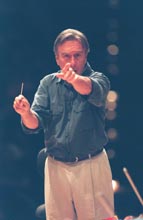|
THE WANDERER'S CHRONICLE ABBADO IN TURIN (April 2006)
|
I still well remember the shattering Pelléas und Mélisande in Vienna on May 12th 2002, the day before the last farewell to the Berlin Philharmonic. That evening, Schoenberg’s music reached the heart of the musicians in such a way that you could read it on their faces and in their eyes. It was nearly unbearable. Turin was different – less “felt” than in Vienna where the circumstances were very special. A different emotion was present, probably more related to the work. Schoenberg’s opus, heard ten days after Debussy’s Pelléas et Mélisande (in Salzburg), is caracterized in Abbado’s interpretation by great flowing lines which make even more memorable the tragic tale told here. Abbado never marks the passage from one scene to the next in this poem as everything follows on in an irremediable way, with its moments of tension, of tenderness and this slow, final diminuendo which leads towards death. Although there are many musicians on the roll (three harps, twelve double basses etc.) one is inclined to think that a culmination is missing, but truth to tell this is exactly what Maeterlinck (and Debussy) intended. The piece is played with a confounding simplicity, without effects, but with an absolutely clear sound. One can hear each group, despite the attempt to reduce the sound at all costs (the flutists even cover up their instruments with a handkerchief). We will remember in particular the celli (led by the young and talented Benoît Grenet) and the (12!) double basses which towards the end dominate and give the score its particular colour. One is struck by the tension and the commitment which recall the Gurrelieder (a work one would love to hear Abbado conduct again – ever since the memorable 1996 tour of the GMJO) - or some work by Strauss. I had the chance to hear Mahler’s 4th symphony twice in a fortnight: once in Salzburg, played by the Berlin Philharmonic conducted by Sir Simon Rattle, once in Turin, played by the Gustav Mahler Jugendorchester, conducted by Claudio Abbado. In addition to that the souvenir of the Berlin concerts 2005 (Berliner Philharmoniker, Claudio Abbado) still rings in my ears and then there is the DG recording which resulted from these concerts. Without wanting to compare (in terms of quality) two very different performances I must compare two evenings very different in their approach to the work. The Salzburg audience left the concert full of admiration for the performance of the Berlin orchestra. They gaped at the perfection of the technical execution. Even those accustomed to hearing this orchestra for many years - the method of approaching longheld notes, the sharpness of attack, the resounding fullness, with a special mention of Albrecht Mayer’s oboe and Dominik Wollenweber’s cor anglais. All this, of course, is well known but merits to be mentioned again. Thanks to such an instrument, without doubt the most accomplished of orchestras, Sir Simon Rattle has no difficulty whatsoever in making his opinions heard: we are at the very top and our remarks cannot in any way diminish the merits of one or the other. Simon Rattle has an acute sense of the theatrical. He continually “stages” the sound, he stresses the contrasts, always going to the extreme – either in the pianissimo or in the forte, setting off once this instrument, once that, so as to obtain – or so it seems – a special effect. The symphony is there, we admire it, like a block of white marble, perfectly polished, but sometimes icy. Only “human” touch: the beautiful, very natural, rendering of the Lied from “Des Knaben Wunderhorn” by Magdalena Kozena. This sends the contribution by Renée Fleming (with Abbado) there where it deserves to be: in the river Lethe, the river of oblivion. Sir Simon Rattle approaches music as a director, as an artist like David, as an architect like Bernini. He builds a monument. At the other end of the scale here we have Claudio Abbado: he has a youth orchestra without great experience apart from the high technical qualities learnt at the academy of music, without really the knowledge of interpretation apart from that which their age permits – but with that intuition full of genius which distinguishes the artist. They learn from Claudio Abbado how to penetrate into the work. Monica Bacelli’s contribution resembles that of Magdalena Kozena - it is natural and fluid, as is the concert. Of course, the interpretation resembles the one heard last year in Berlin, but we had the impression that Abbado used more rubato than in Berlin. Abbado approaches music as a humanist, as a sensitive and tormented artist, as an architect like Borromini. He builds a labyrinth. His latest comments on Venezuela confirm this, if necessary: music has something to tell us about ourselves. We understand why the young musicians like Abbado so much. He does not teach them how to play, but how to feel. As their technical facilities are exceptional they have no difficulty hitting the right note. Making music together is first and foremost being together, forming a group - and the moving farewells the musicians exchanged amongst each others are the most evident mark of this. It is clear that the various international orchestras founded by Abbado are above all a project enabling people to be together, to do things together, to feel together. That, for Abbado, is the key to music. And that is doubtless what causes the audience to break into fits off delirium – less so in Turin perhaps, but in particular (so we have been told) in Vienna. Vienna – this capital of music, Mahler’s town, the one where (as in Berlin) music is more a necessity than an entertainment. |
|
